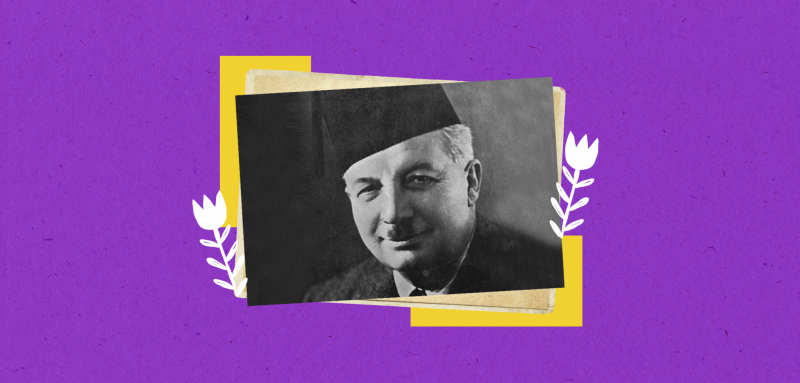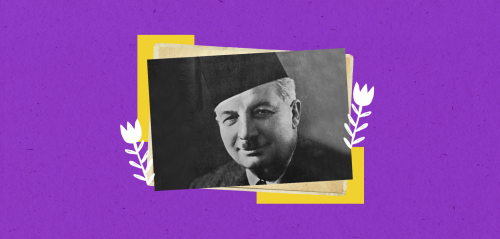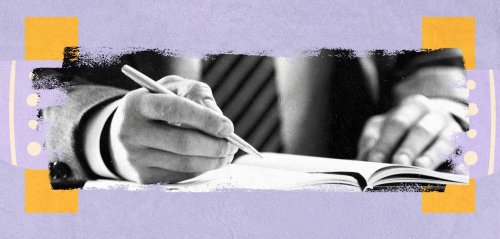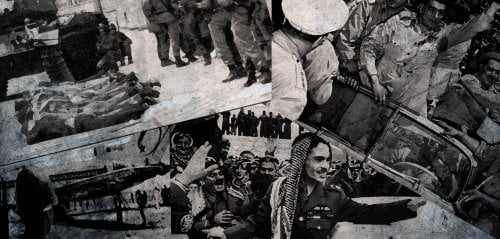At exactly 3:45 PM on July 16, 1951, an olive-colored Hudson car approached the convoy of former Lebanese Prime Minister Riad Al Solh as he was on his way to the airport in the Jordanian capital, Amman, and opened fire on him. Solh was shot in the heart and arrived at the Italian hospital dead, while his accompanying doctor, Naseeb Berber, sustained minor injuries.
Solh's convoy consisted of two cars; one was hit, and the other pursued the assailants. In the pursuing car were President Abdul Aziz Arab and an officer from the Jordanian Royal Guard. As they approached the perpetrators, all three of them jumped out of the car, and the architect of the operation, Michel al-Deek, killed himself to avoid being captured by the Jordanian authorities. Al-Deek was a Lebanese man from Tripoli who worked in Syrian customs, and upon retirement, he opened a restaurant and café in the Syrian city of Daraa near the border with Jordan.
As for his partner, Mohammed Adib Salah, he was a deputy officer in the Jordanian army and had proposed to al-Deek to wear the uniform of a sergeant in the Jordanian Air Force and assassinate Solh at Amman airport. He was unable to escape and also shot himself, but he was arrested and taken to the hospital for questioning before his death. The third accomplice, Aspiro Wadih, was a driver on the Damascus-Amman road, and he used his Hudson car to carry out the crime. He managed to escape the Jordanian authorities and moved to live in Brazil using a Syrian passport, where he passed away many years later.
The crime may seem straightforward as revenge carried out by Syrian nationalists to retaliate for their leader's death. But countless questions remain; The first being why King Abdullah insisted on Solh traveling to Amman without providing adequate protection
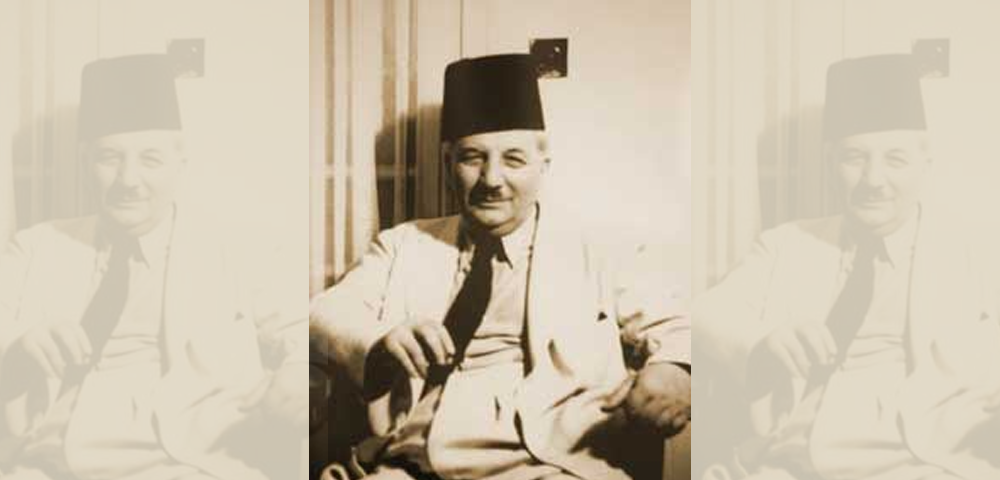 Black and white photo of Riad Al Solh, founder of the state of Lebanon
Black and white photo of Riad Al Solh, founder of the state of Lebanon
On the morning of July 17, 1951, the body of Riad Al Solh returned to Beirut, accompanied by Prince Nayef bin Abdullah. All of Lebanon was draped in black, mourning the loss of one of the founding fathers of the Lebanese state. In the investigations, it was revealed that the three assailants were members of the Syrian Social Nationalist Party (SSNP), and that the order for the assassination had come from their leader, Georges Abdul Messih, in revenge for the execution of the party's founder, Anton Saadeh, on the orders of Solh in 1949. It was said that when they opened fire on Solh, they yelled, "Take this from Saadeh's hand!" This is the declared and documented reason for the crime in history books and judicial investigations. However, there are still questions about the case that have not been thoroughly studied, the first of which is: What was the reason for Riad Al Solh's visit to Jordan?
The Amman visit
The relationship between Riad Al Solh and King Abdullah wasn't too good. Solh accused him of secret collaboration with the Israelis during the 1948 Palestine War. Solh himself had met with Zionist figures in the 1920s and 1930s, but he considered all these meetings to have taken place before the occupation of Palestine and the declaration of the State of Israel, and not in the midst of the Palestinian war. Solh was a friend and ally of the former President of Syria, Shukri Al-Quwatli, who was a staunch enemy of King Abdullah. The latter stood against the Greater Syria project that the king had called for to unify Syria and Jordan under the Hashemite throne. Solh positioned himself within the Syrian-Saudi-Egyptian alliance that opposed the Hashemite aspirations in the Arab world. This may explain King Abdullah's attempts to win Solh's favor and meet with him during his visit to Beirut in May 1951.
It was said that when the attackers opened fire on Riad Al Solh, they yelled, "Take this from Saadeh's hand!"
In June, four months after leaving the premiership, the king called Solh and invited him to Amman to discuss a matter of "great importance". The invitation piqued the curiosity of Solh, and he decided to accept the invitation and travel to Jordan. He arrived at the Mafraq Airport near Amman on July 13, 1951, accompanied by his personal physician and personal escort, as well as journalists Mohammad Shukair and Bechara Maroun.
They were received by the Jordanian Prime Minister Samir Pasha al-Rifai and the Minister of Finance Suleiman Nabulsi. They were taken directly to meet the king at the recently constructed Basman Palace on the eastern side of Raghadan Palace.
Several closed-door bilateral meetings took place between the Lebanese leader and the Jordanian king, and Solh kept the details of these meetings confidential from Mohammad Shukair, requesting him not to publish anything in the Al-Nida' newspaper. He mentioned that the king was frank with him, stating that despite the absence of friendship between them, he considered Solh one of the most important Arab leaders whose popularity extended beyond the borders of their countries. The king sought Solh's assistance to achieve an important matter, which was the unification of Jordan and Iraq after his departure.
King Abdullah stated that he was getting older and was concerned about the future of Jordan after him. His eldest son and crown prince, Prince Talal, suffered from psychological disorders and was incapable of assuming responsibility – according to Solh – and his grandson, Prince Hussein, was still young and needed a lot of time and preparation to become a king. Based on this, the king decided to unite his country with Iraq to preserve the Hashemite monarchy, and he wanted Solh to promote this idea to Arab leaders in order to ensure that no external interventions would occur after his departure. After the meeting with the king, Solh contacted his wife in Beirut and told her that he was returning with "good news that would please the heart of every Arab".
The dispute with Bechara El Khoury
Here we cannot deny the need for reconciliation to open a new page with Abdullah, meaning that rapprochement with Jordan was in his interest, given his deteriorating relationship with Syria and the worsening of his alliance with President Bechara El Khoury within Lebanon. Solh and El Khoury had been allied since Solh came to power in 1943 and had worked together on the famous National Pact that defined the sectarian distribution of power in Lebanon between the Maronite Christians and Sunni Muslims.
They worked together to fight against the French and were arrested together in November 1943, with their release from detention marking the Lebanese Independence Day. Solh also made significant efforts to secure El Khoury's re-election for a second presidential term, but the latter decided to abandon him on February 13, 1951, fearing the dominance of the premier of the "Muslim" government over the presidency of the "Christian" one due to Solh's overpowering charismatic personality and great popularity among both Muslim and Christian communities.
The dispute with Syria
Regionally, Solh had a strong disagreement with the Prime Minister of Syria, Khalid al-Azm, and with Colonel Adib al-Shishakli, the perpetrator of the first coup in Syria in January 1949. Al-Shishakli had not yet executed his second coup, which ousted President Hashim al-Atassi at the end of 1951, but it was widely known that he was the ultimate authority in Damascus and a close associate of the Syrian Social Nationalist Party, to which he had been a member of since his youth.
After the celebrations, Solh decided to return to Lebanon by land route. But the king insisted on sending a private plane to transport him to Beirut, according to a book about the life of Solh by Patrick Seale. On his way to the airport, he was assassinated
Al-Shishakli revolted against Saadeh's handing over to the Lebanese authorities in July 1949 and was greatly angered by Saadeh's execution that was ordered by Solh. He took part in Sami al-Hinnawi's coup against Husni al-Za'im, and it was said that he took the leader's blood-stained shirt and presented it to Saadeh's widow in Deir Saidnaya, saying that they had washed the blood with blood. Solh was concerned about any retaliatory operations that al-Shishakli and his comrades in the Syrian Social Nationalist Party might lead, and he believed that it was necessary to strengthen his Arab position by resolving his dispute with the Jordanian king, who was close to the West, particularly Britain.
Back to the Jordan visit
Solh was an honored guest by King Abdullah and stayed at the historic Philadelphia Hotel in Amman. In addition to political discussions with the king, a poetry duel took place between them, and receptions were held for him at the Lebanese and Saudi embassies in Jordan. After the celebrations and feasts, Solh decided to return to Lebanon by land route. But the king insisted on sending a private plane to transport him to Beirut, according to a book about the life of Solh published in 2010 by British journalist Patrick Seale. On his way to the airport, he was assassinated by members of the Syrian Social Nationalist Party, just a few days before the assassination of King Abdullah in Jerusalem.
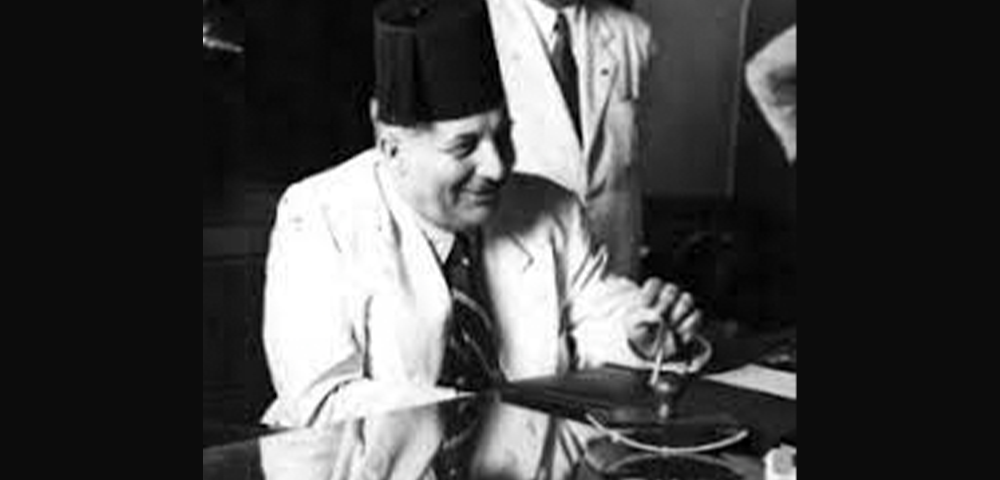 Black and white photo of Riad Al Solh, founder of the state of Lebanon
Black and white photo of Riad Al Solh, founder of the state of Lebanon
The crime may seem direct and straightforward as an organized revenge crime carried out by Syrian nationalists in retaliation for the killing of their leader. However, countless questions remain; The first one being the reason why King Abdullah insisted on Solh traveling to Amman without providing him with adequate protection, especially knowing that his life was in danger. Only one officer from the Royal Guard was sent to bid him farewell, without any support from the police or army, which may be attributed to the fact that the Jordanian capital was very safe, indicating that there was no fear for the safety of their Lebanese guest.
However, many have wondered about the possibility of the Jordanian authorities being complicit in the crime – not King Abdullah – because one of the perpetrators, as mentioned earlier, was a deputy officer in the Jordanian army. This may explain the slow speed of the car in which Solh rode, with suspicions regarding the driver who might have been involved in the conspiracy, where he slowed down the vehicle enough for Michel al-Deek to be able to land a direct hit on Solh and shoot him in the heart.
Raseef22 is a not for profit entity. Our focus is on quality journalism. Every contribution to the NasRaseef membership goes directly towards journalism production. We stand independent, not accepting corporate sponsorships, sponsored content or political funding.
Support our mission to keep Raseef22 available to all readers by clicking here!
Interested in writing with us? Check our pitch process here!
